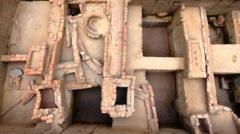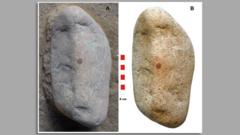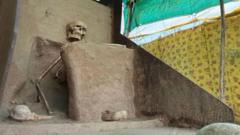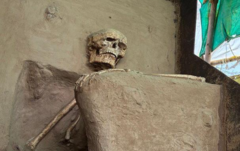The village of Keeladi, located in Tamil Nadu, has grown from a simple excavation site to a focal point of controversy, illuminating historical divides across India. Archaeologists have uncovered a treasure trove of artifacts, with estimates suggesting they date back between 2,000 and 2,500 years, including terracotta fragments and sophisticated urban infrastructure.
Since archaeological work began in 2014, the Tamil Nadu State Department of Archaeology has excavated over 15,000 artifacts from just four of the designated 100 acres. Findings include coins, burial urns, and intricate water systems, suggesting that Keeladi was a significant urban settlement with a literate society. Ajay Kumar, leading the excavation team, has emphasized the site's implications for understanding South India's historical role and identity.
The discoveries have stirred excitement across Tamil Nadu, as they serve to challenge the prevailing north-centric view of India’s ancient civilizations. Individuals like William Daniel from Kerala express a sense of pride in recognizing the long and rich history of southern India. The discoveries highlight the complexities of ancient urbanization in India, pushing back against narratives that suggest the north played a singularly major role in civilizational development.
Debates are now unfolding around the implications of Keeladi’s archaeological findings. Questions arise about the age of the Tamil Brahmi script found in the region, which some argue predates the Ashokan Brahmi script prevalent in northern India. This has opened up discussions about literacy and its spread, suggesting that the cultural and historical connections across India may be more intricate than previously perceived.
The political landscape surrounding Keeladi is similarly charged. The transfer of ASI archaeologist Amarnath Ramakrishnan, who led the Keeladi excavations, has been fraught with accusations of hindering Tamil Nadu's cultural legacy. The state government has been vocal about what it perceives as a deliberate effort by the federal authorities to suppress information linked to Tamil history.
Despite the political turmoil, the Keeladi site offers more than just a battleground for historical narratives; it represents a common thread that binds diverse cultures. Journalist Sowmiya Ashok articulates that unearthing history is pivotal in understanding shared human experiences, indicating that the perceptions of past conflicts are predominantly influenced by contemporary issues.
As Keeladi's archaeological significance continues to evolve, it becomes increasingly clear that the site's impact will resonate well beyond its physical findings, possibly reshaping the very fabric of regional identities within India.






















